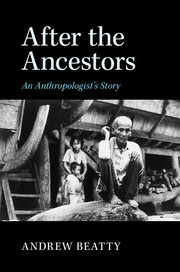Book contents
- Frontmatter
- Epigraph
- Contents
- List of illustrations
- Preface
- People
- Map
- Prologue
- 1 The statue
- 2 House key
- 3 Among women
- 4 Blood brothers
- 5 Daggers and debutants
- 6 Stormy Sunday
- 7 Three things that matter
- 8 The making of great men
- 9 A game of chess
- 10 Cholera song
- 11 Progress
- 12 Brothers and strangers
- 13 Exile and return
- 14 Field work
- 15 The chicken's neck
- 16 Good deaths and bad deaths
- 17 First family
- 18 Blessing
- 19 Half an egg
- 20 Waiting
- 21 Death of a chief
- 22 Ama Jonah at bay
- 23 Unravelling
- 24 The ethnographer and his double
- Epilogue
- Index
21 - Death of a chief
Published online by Cambridge University Press: 05 March 2015
- Frontmatter
- Epigraph
- Contents
- List of illustrations
- Preface
- People
- Map
- Prologue
- 1 The statue
- 2 House key
- 3 Among women
- 4 Blood brothers
- 5 Daggers and debutants
- 6 Stormy Sunday
- 7 Three things that matter
- 8 The making of great men
- 9 A game of chess
- 10 Cholera song
- 11 Progress
- 12 Brothers and strangers
- 13 Exile and return
- 14 Field work
- 15 The chicken's neck
- 16 Good deaths and bad deaths
- 17 First family
- 18 Blessing
- 19 Half an egg
- 20 Waiting
- 21 Death of a chief
- 22 Ama Jonah at bay
- 23 Unravelling
- 24 The ethnographer and his double
- Epilogue
- Index
Summary
The house was once again empty. The walls were greasy and black. A stale odour of blood and ashes hung in the air.
In our absence the chief's carers had dispersed. Ina Ria and Ama Ezra had gone back over the hills, the elders' sympathy had run dry, and even the ancestors seemed to have taken their leave. Against all hopes they had not restored the chief's health: the repentance signalled by his return to the house had been spurned. Now there was no one left to console him. “Why do you leave me alone all day!” he had bawled at his wife.
Or so Ina Mulisa told me; for soon after our departure to Gunung Sitoli, he was carried back down to the small dark house by the market. The spirits, the blessings of kin, prayers, medicines and magic had all failed.
On my return – now solo – a week later, I found him sipping tea with a group of cronies outside his house. Though the rasping voice still held up, the body was emaciated like that of a starving man. And his face showed a remarkable change. The black eyes were fierce and staring, with lines of pain at the corners. The flesh of his jowls had disappeared, leaving his jawline lean and pointed, almost foxy. The men around him seemed chastened and nervous, perhaps alarmed, as I was, by his desperate expression and the way he kept pursing his lips and baring his teeth. No one dared meet his glare.
It seemed to me that the change had come about not just because of the constant pain he was suffering but because he had taken an attitude to his illness. Having tried everything, he knew he was condemned, damned even, but he was on his guard, possessed of a new resolve. In the old days you had to be wary of dying chiefs. They would order killings, settle scores without fear of revenge. With his usual lack of tact, Ama Festi had reminded people of this; though perhaps others had thought it too.
- Type
- Chapter
- Information
- After the AncestorsAn Anthropologist's Story, pp. 301 - 319Publisher: Cambridge University PressPrint publication year: 2015

